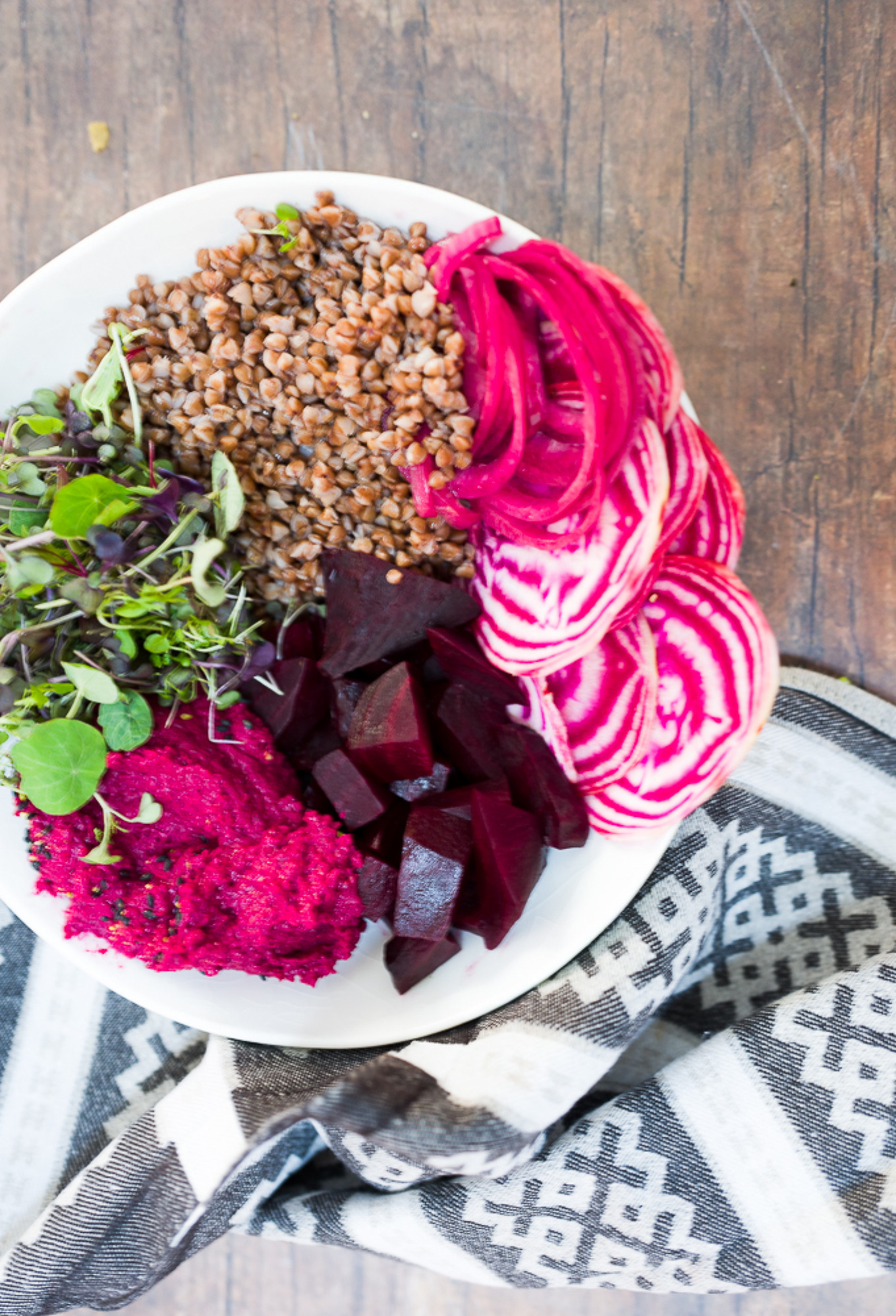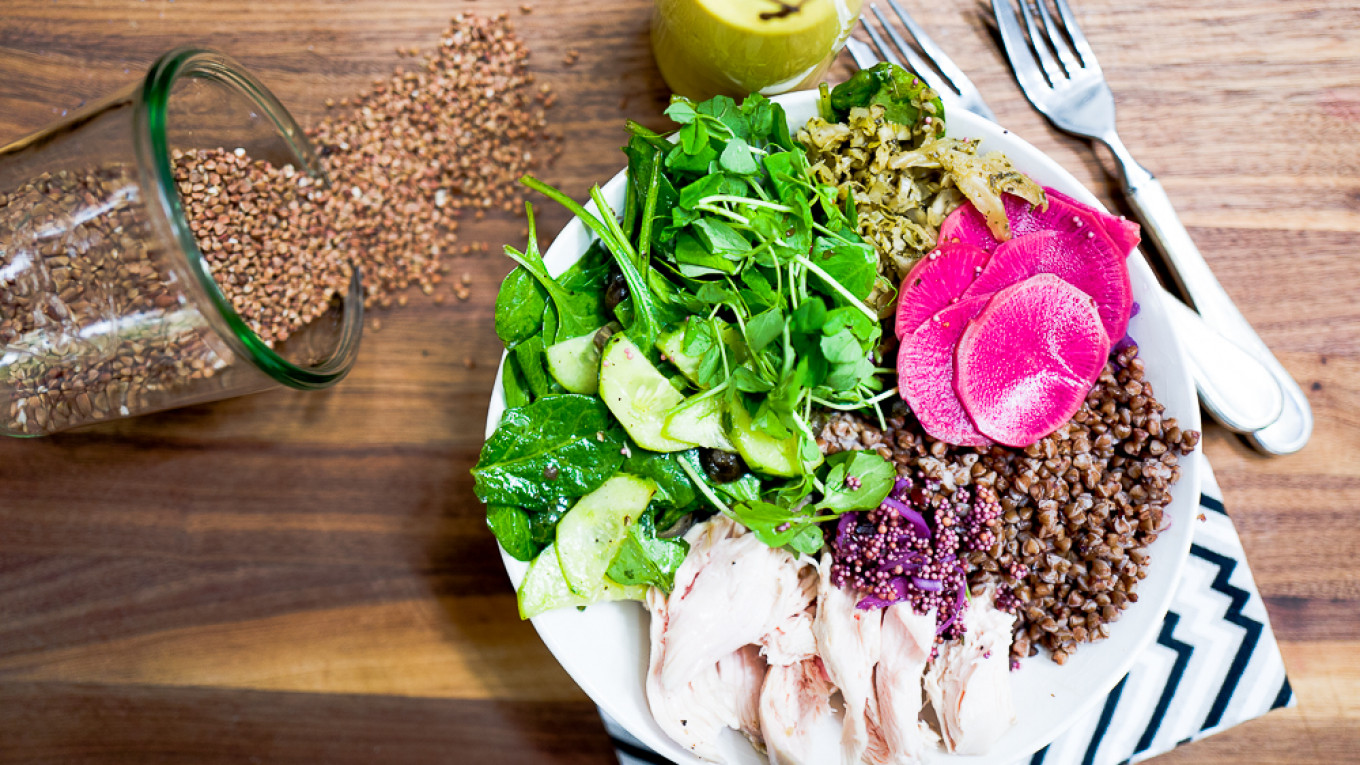So, you've cornered the grechka market. Well done. Now what?
You picked an excellent grain to stockpile. Buckwheat packs an incredible nutritional punch: it promotes heart health and is a superb source of many key vitamins and minerals (including thiamin, niacin, and folate) as well as protein and fiber. Buckwheat is one of those foods that releases energy slowly and steadily for hours: a bowl of buckwheat kasha can set you up for the day. And despite its name, buckwheat is gluten-free. It gets its name in English from the Dutch, who were so impressed with its hardiness and ability to thrive even in bad soil, that they christened it "boek weit" or "book wheat," likening it to the Holy Bible.
Russians eat a ton of buckwheat, and stockpiling it is very much baked into the national character whenever trouble — be it a regularly-scheduled economic Armageddon, invading armies, or, as we are faced with today, plague, appears. Many of my emigre friends recall filling their suitcases not with clothes but with packets of grechka to live on in their new country until they could get on their financial feet.
If this stuffing-the-suitcase thing seems over the top, be aware that the buckwheat groats sold outside Eastern Europe are simply not acceptable. Not to anyone familiar with the real thing. Something is missing in North American buckwheat — the nutty outer layer — which is where all the nutrients hunker. This version turns to mush, no matter what you do to it. Now you know why former expats and Russians abroad will trek vast distances to specialty shops to stock up on real grechka. I felt my first stab of coronavirus panic when my attempts to up my standing online order resulted in the dreaded "temporarily out of stock" banner.
But I'm not that concerned, because I, of course, have a 10-kilo reserve. And now that you do, too — or can buy it at Russian or Central-East European specialty groceries — what will you do with all those lovely, nutty, nutrient-rich groats?
You could make simple porridge, and serve it with lots of butter or grated cheese. You could make a wonderful vegetarian dish of Buckwheat and Mushrooms or delve into our Dacha Diaries for "Buccouli." You might swap it in as your evening starch instead of potatoes or rice: buckwheat's nutty flavor is a lovely foil for grilled meat and oily fish. But today I'm going to suggest you use it as the basis for a healthy and delicious grain bowl.
Grain bowls are perfect for this open-ended "social-distancing" period we seem to all be in right now. If you make a batch of buckwheat at the beginning of the week and some fun sauces, you can come up with an infinite number of different grain bowls throughout the week. In my house, we keep the leftovers moving by incorporating them into the following day’s bowl. This makes for a quick assembly, infinite variety, and a tidy fridge.
So open that packet of grechka you've been hoarding, consult the infographic below and assemble a grain bowl! You'll be glad you did!
Grechka Grain Bowl

Prepare the buckwheat
- Place 1 1/2 cups buckwheat groats in a fine mesh colander and run cold water over them for about 3 minutes.
- Place the buckwheat groats in a heavy-bottomed pan over medium heat. Add a generous pinch of salt and toast the groats for 5 minutes.
- Pour 3 cups of cold water into the pan and bring to a simmer.
- Reduce the heat to low, cover, and simmer for 15-20 minutes until all the water is absorbed.
Turmeric Tahina Grain Bowl Dressing
This is my favorite dressing, which I make with coconut milk because I love its silky texture, but you can use kefir or yogurt with similar results.
Ingredients
- 1 tin (13.5 oz, 400 ml) coconut milk
- 1 Tbsp of ground turmeric
- 1 cup (235 ml) miso or chicken broth, at room temperature
- ⅓ cup (80 ml) apple cider vinegar
- ½ cup (118 ml) peanut oil
- ¼ cup (60 ml) sesame oil
- ⅓ cup (80 ml) soy sauce
- 4 Tbsp creamy peanut butter or tahini (or both…)
- 1 knob of fresh ginger, grated (this is optional, but gives the sauce a lovely zing)
- The juice of one lime
- Salt and pepper to taste
Instructions
Combine all the ingredients in a blender or food processor fitted with a steel blade. Process until smooth. Store up to 2 weeks in the refrigerator.

Quick Red Onion Pickles
Ingredients
- 2 red onions, peeled and thinly sliced
- 2 cups (475 ml) red wine vinegar
- ⅓ cup (80 ml) kosher salt
- ⅓ cup (80 ml) brown sugar or honey
- 1 Tbsp mustard seeds
- 1 Tbsp carraway seeds
- 1 Tbsp black peppercorns
- 1 Tbsp coriander
- 2 bay leaves
Instructions
- Wash a quart-sized lidded glass jar carefully with hot, soapy water.
- Place the bay leaves at the bottom of the jar and then stack the onion slices in the jar, pressing down firmly, so they all fit in.
- Combine the remaining ingredients into a saucepan and bring to a boil. Reduce the heat until the mixture is gently simmering. Cover and let cook for 12 minutes.
- Pour the hot mixture over the onions until the liquid reaches the top of the jar. If you don't have enough, top up with more vinegar.
- Allow the jar to come to room temperature before putting the lid on. Keep in the refrigerator for up to 14 days.
A Message from The Moscow Times:
Dear readers,
We are facing unprecedented challenges. Russia's Prosecutor General's Office has designated The Moscow Times as an "undesirable" organization, criminalizing our work and putting our staff at risk of prosecution. This follows our earlier unjust labeling as a "foreign agent."
These actions are direct attempts to silence independent journalism in Russia. The authorities claim our work "discredits the decisions of the Russian leadership." We see things differently: we strive to provide accurate, unbiased reporting on Russia.
We, the journalists of The Moscow Times, refuse to be silenced. But to continue our work, we need your help.
Your support, no matter how small, makes a world of difference. If you can, please support us monthly starting from just $2. It's quick to set up, and every contribution makes a significant impact.
By supporting The Moscow Times, you're defending open, independent journalism in the face of repression. Thank you for standing with us.
Remind me later.







